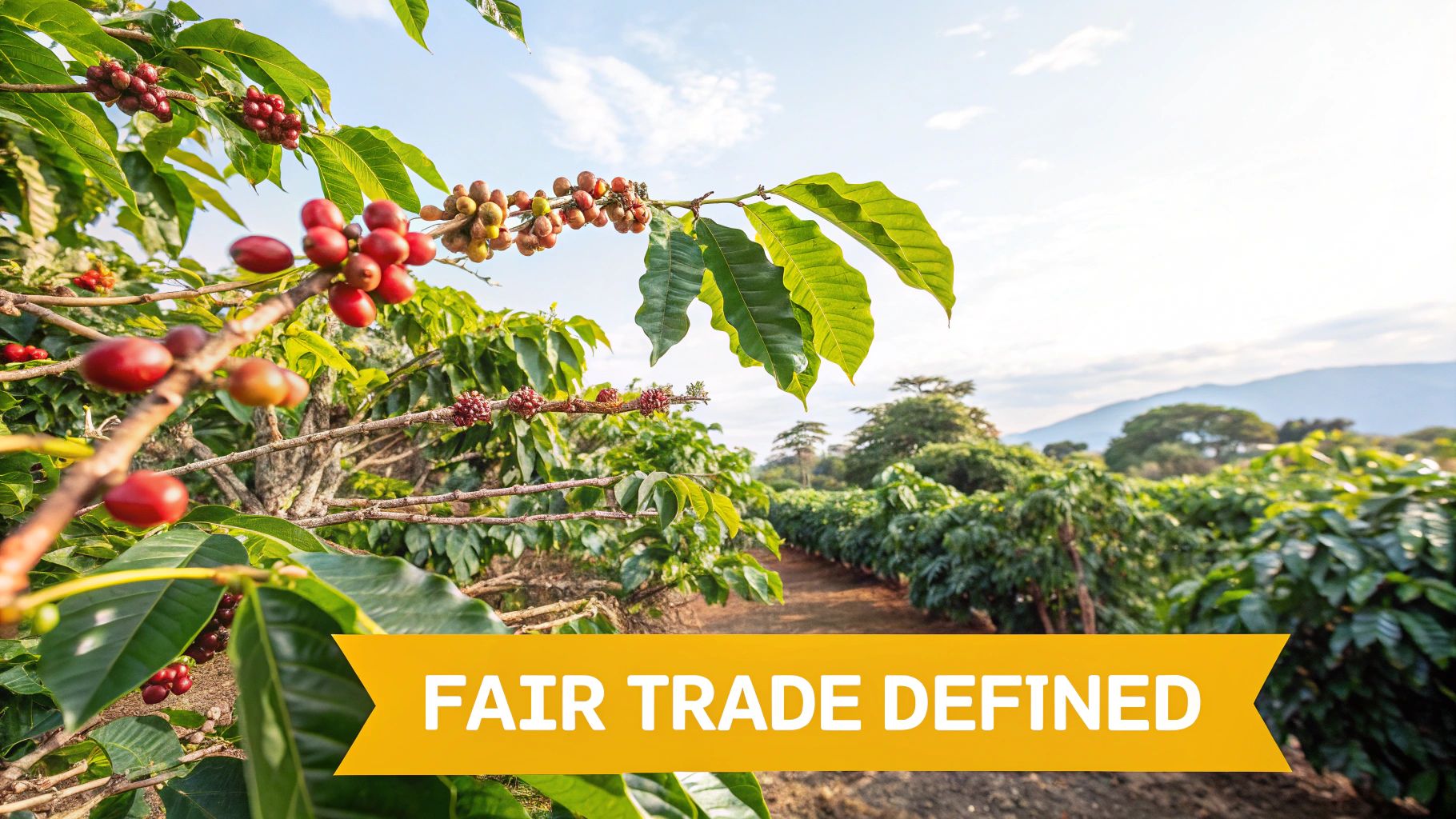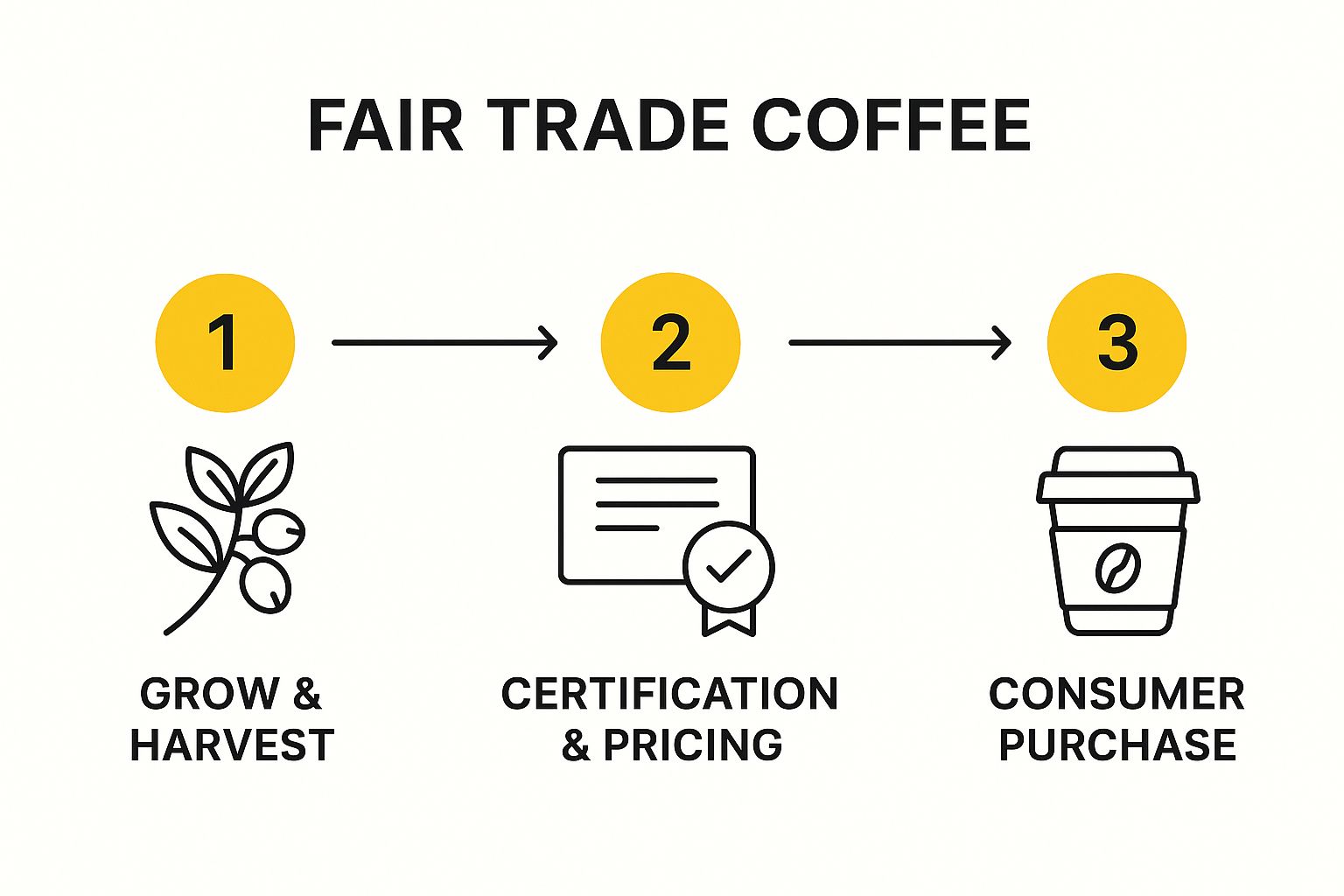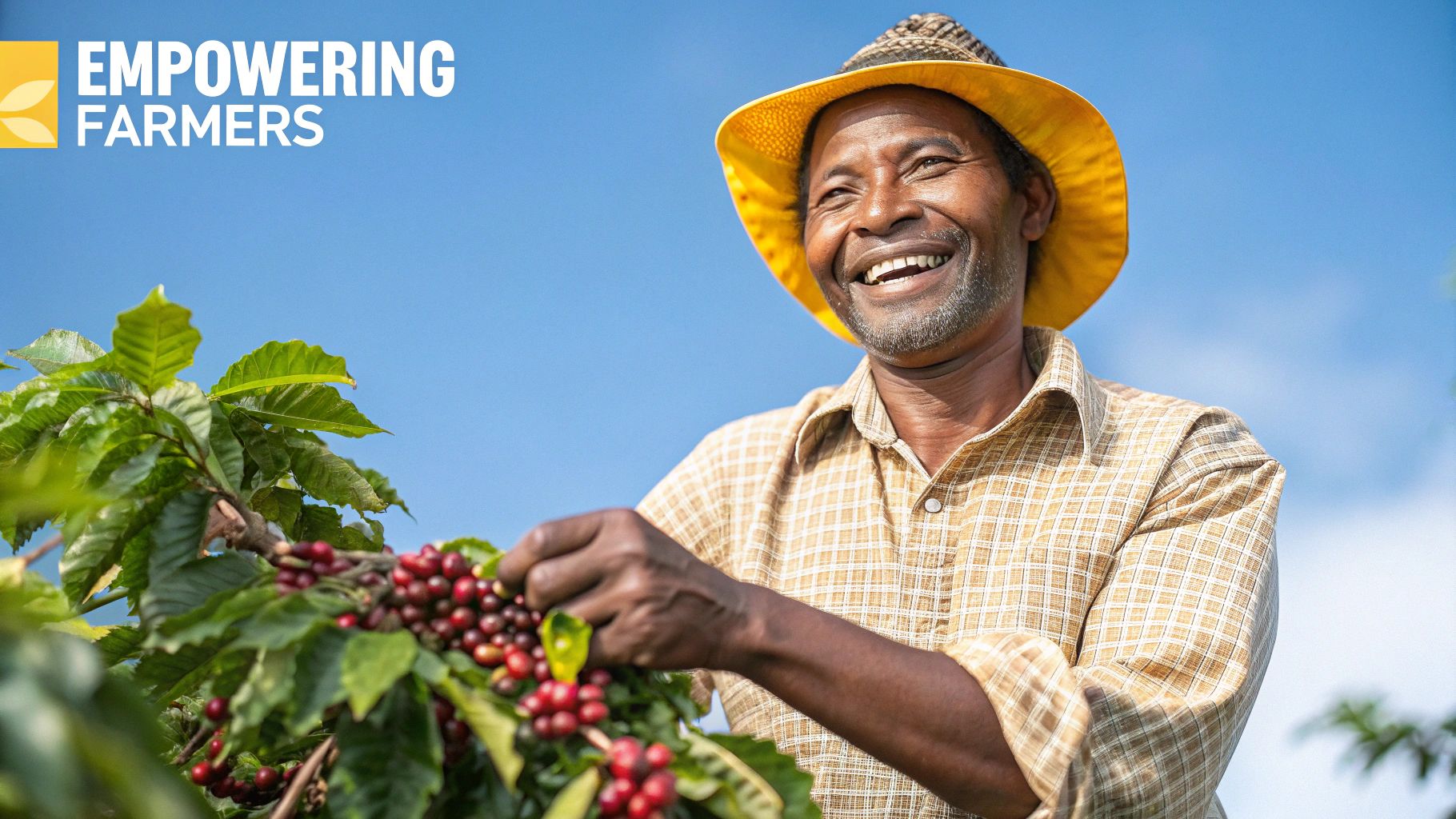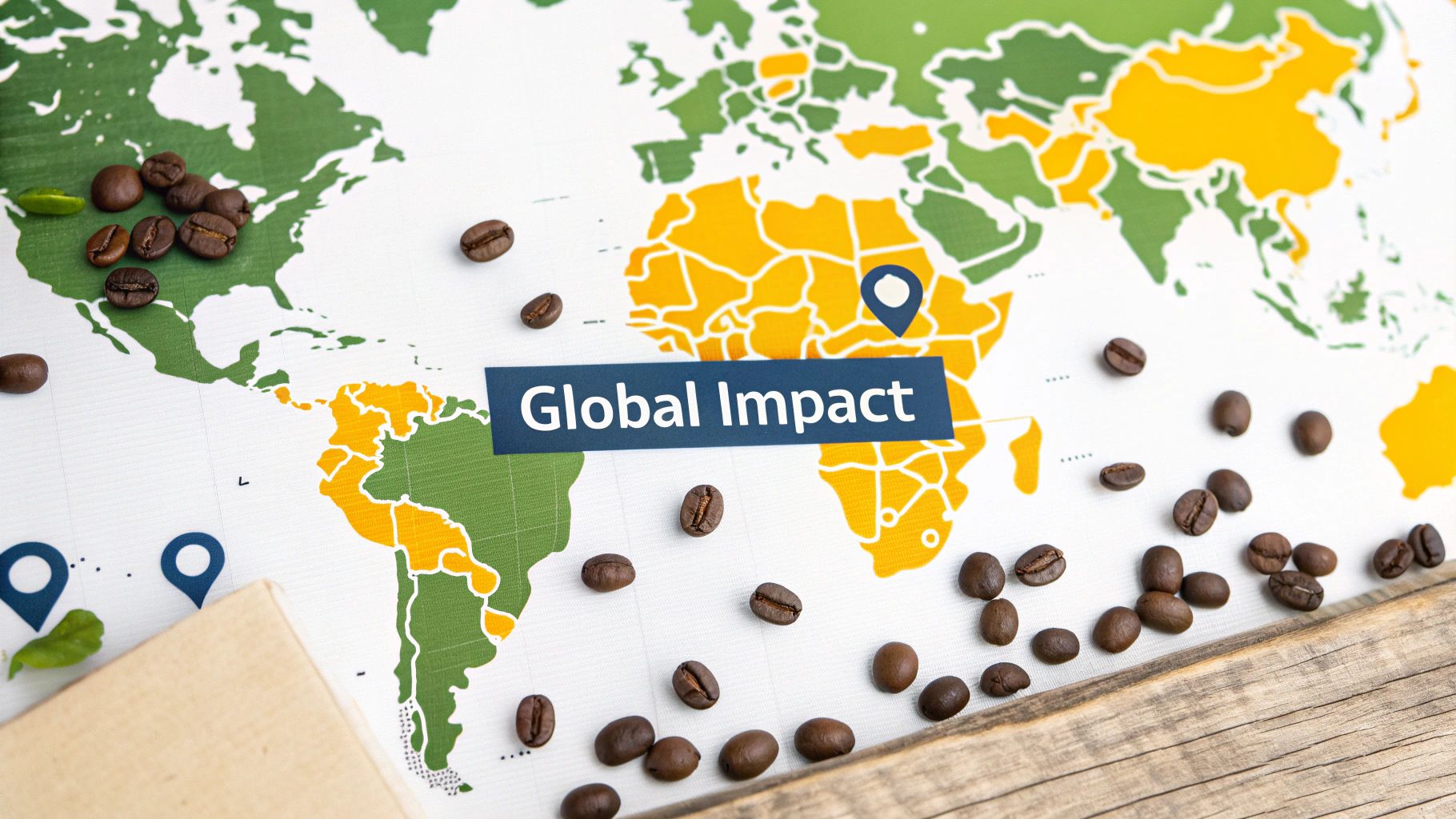So, what exactly is fair trade coffee? At its core, it’s a promise—a commitment that the people who grow your coffee beans get a fair deal. This means they receive fair pay, work in safe conditions, and use farming methods that are kinder to our planet.
Think of it as a direct partnership between you and the farmer. Every time you buy fair trade, you’re helping build a more stable and equitable world, one cup at a time.
The Story Behind The Seal

But fair trade is more than just a simple definition; it’s a global movement built on ethical sourcing and mutual respect. It was created to give small-scale farmers a fighting chance in a notoriously volatile market. You could almost call it a "social contract" connecting you, the coffee drinker, directly to the well-being of coffee-growing communities.
This entire system rests on a set of tough standards that producers have to meet to earn that coveted certification. These aren't just friendly suggestions—they're audited rules covering everything from pricing and labor rights to environmental protection.
A Safety Net For Farmers
One of the most powerful parts of the system is the Fair Trade Minimum Price. This acts as a crucial safety net, protecting farmers when the volatile global coffee market takes a nosedive. It guarantees they can always cover their costs for sustainable production, no matter how wild the price swings get.
For example, Fair Trade USA maintains a minimum price and premium system that supports over 600,000 farmers worldwide. It’s a strategy designed to bring stability where there often is none.
On top of that, there's the Community Development Premium. For every pound of coffee sold, an extra bit of money goes directly to the farmer cooperative. The community then gets to democratically decide how to invest it in local projects.
"The premium is a powerful tool for self-determination. It empowers communities to address their most pressing needs, whether it's building a new school, a health clinic, or improving local infrastructure."
To really understand the impact, it helps to see how the two systems stack up against each other.
Fair Trade vs Conventional Coffee At A Glance
Here’s a quick breakdown of the key differences between the fair trade and conventional coffee systems. This table highlights how your choice at the checkout can have a massive impact on everything from a farmer’s income to the health of the local environment.
| Aspect | Fair Trade Coffee | Conventional Coffee |
|---|---|---|
| Pricing | Guaranteed minimum price protects farmers from market volatility. | Prices are dictated by the fluctuating global commodity market. |
| Labor Standards | Enforces safe working conditions and bans child and forced labor. | Lacks standardized protections, leading to potential exploitation. |
| Community Impact | A premium is paid for community-led development projects. | Profits are primarily retained by corporations and middlemen. |
| Environmental Care | Promotes sustainable farming and restricts harmful pesticides. | Often relies on intensive farming that can degrade the environment. |
As you can see, the fair trade model is designed to put power back into the hands of the producers, creating a more sustainable and just supply chain from farm to cup.
How Coffee Earns The Fair Trade Seal
So, what does it really take for a coffee to get that Fair Trade seal? It's far more than just a slick marketing label. The journey from a coffee cherry on the branch to a certified bean in your mug is a serious, detailed process. To earn that seal, farmers and their co-ops have to meet a strict set of international standards, all checked and enforced by independent groups like Fairtrade International and Fair Trade USA.
Think of these organizations as the referees of the coffee world. They're third-party certifiers who make sure everyone plays by the rules, guaranteeing the system actually delivers on its promise of ethical, sustainable coffee. It’s all about accountability.
The first step? Farmers have to team up and form a cooperative. This is a non-negotiable part of the deal. Fair trade is designed to work with democratic groups, not just individual growers. This structure is key—it pools power and profits, giving small-scale farmers a collective voice and bargaining power they just wouldn't have flying solo.

Passing The Audit
Once a cooperative is up and running, it's time for an in-depth audit. Independent inspectors head out to the farms and community facilities to see things firsthand. They verify that everything on the ground matches up with the official standards. It’s basically an open-book exam where every part of the operation—from finances to farming practices—is graded against the fair trade scorecard.
These auditors look at a wide range of criteria across three core areas:
- Economic Standards: This is all about transparency. Co-ops must keep clean books and make decisions democratically. Crucially, this is where auditors confirm the co-op is receiving the Fair Trade Minimum Price and using the Community Development Premium as intended.
- Social Standards: Here, the focus shifts to people. Auditors check for safe working conditions, ensuring there's a strict ban on forced labor and child labor. They also make sure non-discrimination policies are in place and being followed.
- Environmental Standards: These rules are designed to protect the planet. They push for sustainable farming, which includes things like responsible water use, banning the most dangerous pesticides, and actively working to protect local biodiversity.
The certification isn't just a one-and-done deal. To keep their status, cooperatives have to go through regular audits, year after year. This constant verification is what gives the Fair Trade seal its weight and credibility.
From Verification To Your Cup
Only after a cooperative passes this tough inspection can its coffee officially be sold with the fair trade seal. But the process doesn't stop there. Every single player in the supply chain—from the importer to the roaster, like us at Cartograph Coffee—also has to be certified to handle the beans.
This creates a rock-solid, traceable path from the farm right to your kitchen. It guarantees that the coffee you're buying is the real deal.
This verifiable "chain of custody" is what makes the whole system trustworthy. It ensures that the extra bit you pay for a certified coffee goes directly toward supporting the farmers and communities who grew it. It’s a proven mark of an ethical supply chain, accounted for every step of the way.
The Real-World Impact On Coffee Farmers

Understanding the certification is one thing, but the real story of fair trade coffee is written in the lives of farmers and their families. The system delivers tangible benefits through two game-changing mechanisms that offer both stability and opportunity: the Fair Trade Minimum Price and the Community Development Premium.
These two pillars work together to turn a volatile business into a sustainable livelihood. They create a level of security and empowerment that’s often missing in the conventional coffee market, where prices can swing wildly based on global speculation far beyond a farmer's control.
Building A Foundation With A Price Safety Net
The Fair Trade Minimum Price is exactly what it sounds like: a guaranteed floor price for coffee. It’s a crucial safety net, making sure that even if the global market for coffee crashes, farmers in the system will still get a price that covers their average costs of sustainable production.
This isn't about guaranteeing a huge profit; it’s about providing essential financial stability. When farmers know they can at least break even, they can plan, invest in their farms, and provide for their families without the constant fear of being wiped out by a market downturn. This predictability is especially important when exploring different bean varieties, like those found in specialty single-origin coffee. You can learn more by reading our guide on what is single origin coffee.
It’s this basic security that allows coffee communities to shift from just surviving to actually thriving.
Empowering Communities Through The Development Premium
On top of the minimum price, buyers also pay an extra sum of money called the Community Development Premium. This fund goes directly to the farmer cooperative, and the farmers themselves vote on how to spend it on projects that benefit their entire community. This is where the impact becomes visible and truly life-changing.
The premium is a powerful tool for self-determination. It empowers communities to address their most pressing needs, whether that’s building a new school, a health clinic, or improving local infrastructure.
Instead of an outside group deciding what a community needs, the power is put right into the hands of the people who live there. This collaborative approach ensures that investments are meaningful and solve real local problems. The results of these decisions can be seen in communities all over the world.
Real-World Projects Funded By Your Coffee
The Community Development Premium has funded thousands of projects, each one chosen by farmers to solve a specific local challenge. These initiatives often fall into a few key areas:
- Education: Building new schools or adding classrooms, providing scholarships for children to continue their studies, and buying essential school supplies.
- Healthcare: Constructing local health clinics for accessible medical care, funding vaccination programs, and ensuring access to doctors and nurses.
- Infrastructure: Investing in clean water systems, improving roads to better connect farms to markets, and building community centers for meetings and social events.
- Productivity and Quality: Purchasing better farming equipment, providing training on sustainable agriculture, and building improved processing facilities to enhance coffee quality.
Every purchase of fair trade coffee contributes directly to this fund, making each cup you drink an investment in stronger, healthier, and more self-sufficient communities.
Environmental Benefits Beyond The Price Tag
While better pay for farmers is a huge part of the fair trade story, the impact doesn't stop at the price tag. Fair trade certification digs much deeper, enforcing a whole set of environmental and social standards that look at the entire coffee-growing ecosystem.
It’s all built on a simple but powerful idea: you can't have healthy, thriving farmers without a healthy, thriving planet. This connection turns your morning cup into something more—a vote for a system that values both people and the land they depend on.
Protecting The Planet One Farm At A Time
Fair trade standards are all about working with nature, not bulldozing over it. One of the biggest rules is a flat-out ban on the most dangerous pesticides and agrochemicals. This immediately protects farmers, their families, and the local wildlife from exposure to nasty toxins.
Beyond that, the standards champion farming techniques that keep the land healthy for generations to come. This isn't just a list of suggestions; these are audited requirements.
- Water Conservation: Putting smart water management into practice to protect a resource that’s precious in so many coffee-growing areas.
- Waste Management: Creating systems to handle waste properly, preventing pollution from seeping into the soil and local waterways.
- Biodiversity Protection: Encouraging methods that leave natural habitats intact, which is great news for local wildlife.
- Agroforestry: Promoting coffee grown under the shade of native trees. This creates a rich, bird-friendly habitat and often leads to more complex, flavorful coffee beans.
This isn't just about being "eco-friendly." It's about building resilient, biodiverse farms that can stand the test of time.
Upholding Human Rights In The Coffee Fields
The social side of the equation is just as critical. Fair trade standards have a zero-tolerance policy for forced labor and child labor. It’s a non-negotiable part of the deal, giving you an assurance of ethical production that’s often missing in the conventional coffee market.
But it goes further by empowering farmers directly. Fair trade requires them to form democratic cooperatives, giving them a collective voice and far more bargaining power than they'd have alone. They can negotiate better deals, invest in community projects, and access training in everything from business skills to the latest in sustainable agriculture.
This combination of environmental care and social empowerment creates a ripple effect. Healthier environments lead to better crop quality, while empowered communities are better equipped to invest in long-term sustainability.
In a global coffee market projected to hit $473.1 billion in revenue in 2025, fair trade provides a real, meaningful alternative. It connects hundreds of thousands of farmers directly to consumers who care where their coffee comes from. If you want to dig into the numbers, check out the global coffee market forecast. By choosing that fair trade label, you’re not just buying coffee; you’re supporting a model that truly values both people and the planet.
How To Choose And Buy Authentic Fair Trade Coffee

Putting your knowledge into action is the most powerful step you can take. When you're ready to buy authentic fair trade coffee, your best tool is your own eyes and the ability to spot the official certification seals. These logos are your guarantee that the coffee inside has met the tough standards we've been talking about.
Just look for the distinct, trusted marks from the certifying bodies right on the coffee packaging. You'll usually find them displayed clearly on the front of the bag, making them pretty easy to spot.
Decoding The Labels
While a few different organizations certify fair trade products, you'll most likely run into a couple of key players in the coffee aisle. Each seal represents a solid commitment to ethical sourcing, even though they're managed by different global groups.
The most recognizable labels include:
- Fair Trade Certified™: This is the mark from Fair Trade USA, and you'll see it all over products in North America. It tells you the coffee meets their specific standards for social, economic, and environmental protection.
- FAIRTRADE Mark: This is the international logo used by Fairtrade International and its network. It confirms the product follows a globally agreed-upon set of standards, ensuring fairness for producers all over the world.
Both of these seals are a reliable sign that you're supporting a more equitable supply chain. Don't get too hung up on the minor differences between them; the main thing is to find a product that has one of these official certifications.
Remember, the presence of an official seal means the product has been independently audited and verified. It's the difference between a brand simply making a claim and having that claim proven.
Spotting Misleading Claims
Unfortunately, some brands use vague language like "ethically sourced" or "fairly traded" without any third-party verification to back it up. These terms aren't regulated and just don't carry the same weight as an official certification. To make sure your purchase has a genuine impact, always prioritize products with a recognized seal.
Another common point of confusion is Direct Trade. This is when a roaster buys coffee directly from a farmer or a co-op. While it can build some great relationships, it doesn't have the standardized minimum price, community premium, or independent oversight that are so central to the fair trade system.
Once you’ve picked out your ethically sourced beans, you can take your coffee game to the next level. Learn the best way to prepare coffee at home with our detailed guide. Whether you're at the grocery store, a specialty cafe, or shopping online, looking for that seal is always your best move.
Common Questions About Fair Trade Coffee
Even after getting a handle on what fair trade is all about, a few practical questions always seem to pop up. Let's tackle some of the most common ones to clear up any lingering confusion and bust a few myths along the way.
Is Fair Trade Coffee Always Organic
Not always, but you can think of them as close partners working toward the same sustainable goals. Fair trade certification has some pretty strict environmental standards that limit harmful chemicals and encourage earth-friendly farming practices.
That said, organic is a separate certification with its own unique set of rules. A coffee can be one without the other. If you’re after the benefits of both, just keep an eye out for both the fair trade and the organic seals on the bag.
Does Fair Trade Coffee Cost More
It often does, but that small price difference is what powers the whole system. The slightly higher cost is what covers the guaranteed minimum price for farmers and funds the Community Development Premium, which gets funneled right back into local projects.
When you buy fair trade, you're not just paying for the beans; you're investing in fair wages, sustainable agriculture, and community empowerment for the people who grow your coffee.
What Is The Difference Between Fair Trade And Direct Trade
Think of fair trade as a standardized system, audited by a third party, with a clear set of rules that applies across the board. Its main focus is on empowering farmer cooperatives and providing a solid price safety net. It’s all very transparent and regulated.
Direct trade, on the other hand, is more of a personal sourcing philosophy. It's when a roaster decides to buy coffee straight from a specific farmer or farm. While this can lead to some fantastic relationships, the terms are all set privately. There aren’t any standardized protections or a community premium like you get with the official fair trade system. This is also a helpful distinction when considering the difference between ground coffee and instant, since sourcing methods can really change depending on the final product.
At Cartograph Coffee, we believe in quality you can feel good about. Our organic instant coffee brings you exceptional flavor and convenience without compromising on ethical standards.
Explore our collection of high-quality organic instant coffee today.